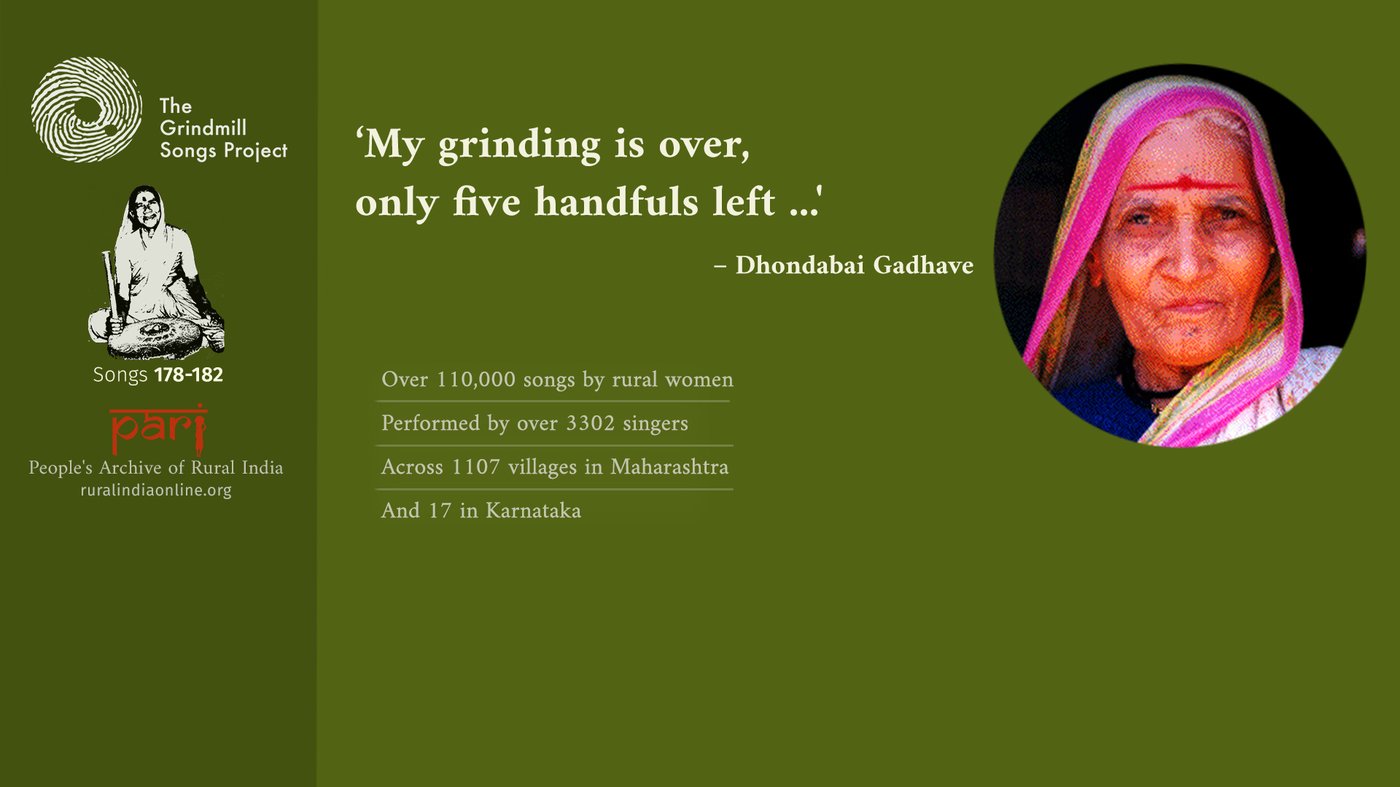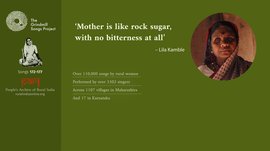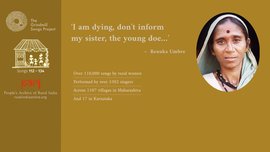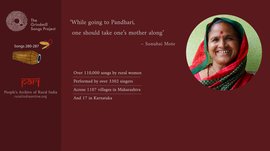In this edition of the Grindmill Songs Project, Dhondabai and Anjanabai Gadhave of Savindane village sing of the relief they feel when they are done crushing grain into flour at the mill. The gods and goddesses, they say, help them through the hard labour
Sant Janabai, a 12th century Bhakti poet, stands tall in a small shrine outside the Gadhave family home. Fakira Gadhave, who belonged to a community of potters, had sculpted this statue when he was alive. Fakira would work at the potter’s wheel, while his wife Dhondabai would mix clay, ready the chul (kiln) for firing the pots, and when those were made, storing them carefully to avoid damage. When they weren’t making pots, the couple worked as agricultural labourers.
Like many women of her generation, Dhondabai would crush grain into flour at the grindmill in her home, sometimes with her daughter-in-law Anjanabai. Together, they’d sing ovi to lighten the load of this daily labour.
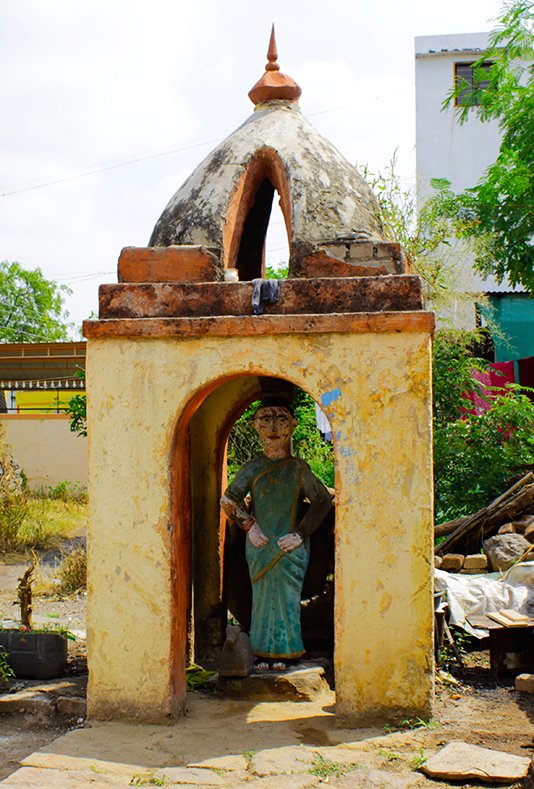
A shrine for Sant Janabai outside the Gadhave family home
Dhonadbai and Anjanabai were among the 15 women from Savindane village in Shirur
taluka
,
who contributed 344
ovi
to the
grindmill songs database
. The team that documented these songs wrote them down and recorded about 250 of them on audiotapes in December 1995.
Jitendra Maid, who was a part of this original team, is also an integral part of the PARI Grindmill Songs Project . We travel to the villages of Maharashtra to meet the grindmill singers and photograph them. On October 8, 2017, we went to Savindane but discovered to our dismay that Dhondabai had passed away in 2008. We were only able to meet Dhondabai’s daugther-in-law Anjanabai that day, and photograph her and her home.
The grindmill songs of
Dhondabai
and
Anjanabai
In the grindmill songs database, we found five ovi sung by Dhondabai and Anjanabai. Dhondabai takes the lead in these songs while her daughter-in-law accompanies her. They sing of the hard labour of crushing grain into flour at the mill and the relief they experience when the grinding is done.
The first line of each couplet begins with ‘the grinding is over’ and the second, which rhymes with the first, evokes images, people, and Hindu gods and goddesses. In the first couplet, they say that when the grinding is over, there are only fragments in the winnow. They recall Lord Vitthal’s tura or plume; he is Rukmini’s bijavara or ‘man with two wives’. (Vitthal, who is also Lord Krishna, is married to Rukmini and Satyabhama.) There is rhyme here – charachura, tura, and bijavara – and repetition, and in each couplet, ‘the grinding is over’ is juxtaposed with a beautiful image.
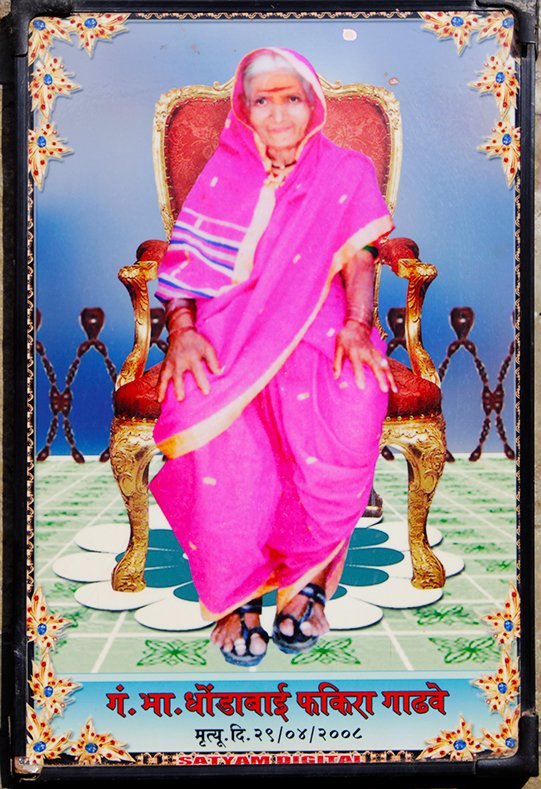
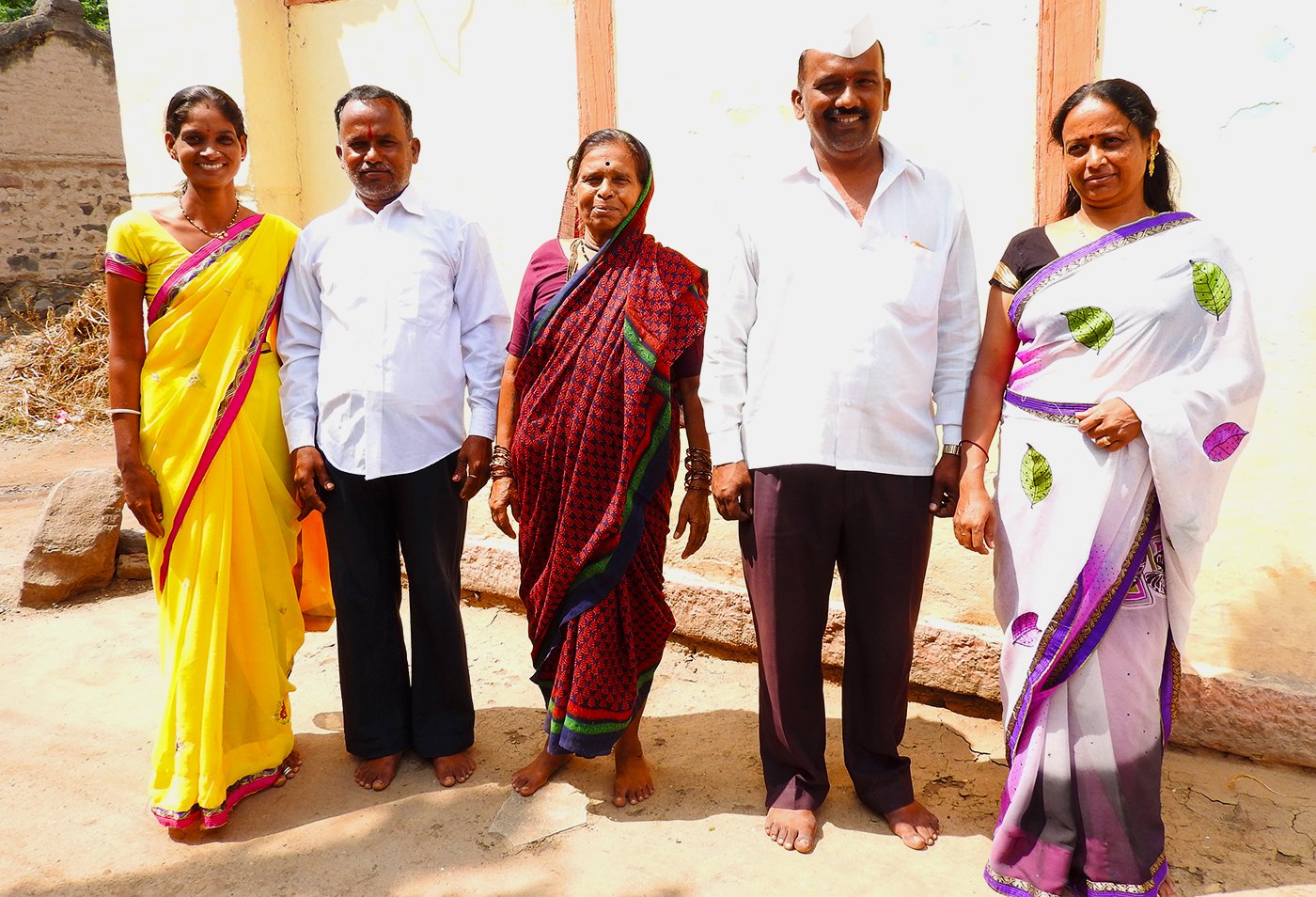
The late Dhondabai Gadhave (left) and her daughter-in-law Anjanabai (right, middle)
In the next two ovi , Dhondabai sings of Sita – in the second, of a young Sita in Ram’s garden and in the third, of a Sita who sits with her at the mill and helps her with the grinding. In the fourth couplet, Dhondabai says that God has given her nephews, but they are her ‘husband’s assets’, implying that they help but only with his work. In the last ovi , Dhondabai asks, ‘Who’s standing there?’ and answers that it is goddess Parvati, who is at the mill, helping her.
Thus the singers bring the personae of Hindu mythology into their midst, and lighten the load of their daily toil. Singing these ovi probably helped the women make their work pleasurable. And the clinking of their bangles, mixed with the sound of stone crushing grain, is music to our ears.
सरील दळयाण या सुपात चाराचुरा
विठ्ठलाचा तुरा ग रुखमीणबाईचा बीजवरा
सरील दळण माझ्या सुपात मातीपोती
रामाच्या बागात सीता होती न्हाती धुती
सरील दळण सरती आरती कोणी केली
रामयाची सीता दळू लागून मला गेली
सरील दळण माझ उरील पाच पस
देवानी दिली भाच माझ्या डोरल्याच ठस
सरील दळण इथ कोण उभी होती
दळू लागून मला गेली शंकराची पारवती
sarīla
daḷayāṇa yā supāta cārācurā
viṭhṭhalācā
turā ga rukhamīṇabāīcā bījavarā
sarīla
daḷaṇa mājhyā supāta mātīpōtī
rāmācyā
bāgāta sītā hōtī nhātī dhutī
sarīla
daḷaṇa saratī āratī kōṇī kēlī
rāmayācī
sītā daḷū lāgūna malā gēlī
sarīla
daḷaṇa mājha urīla pāca pasa
dēvānī
dilī bhāca mājhyā ḍōralyāca ṭhasa
sarīla
daḷaṇa itha kōṇa ubhī hōtī
daḷū
lāgūna malā gēlī śaṅkarācī pāravatī
The grinding is over; in this winnow, only
fragments remain
The plume
of Vitthal, Rukhminbai’s husband who has two wives
The grinding is over, only remnants in my
winnow
The
young Sita was there in Ram’s garden
The grinding is over; who performed the
aarti
at the end?
Ram’s
Sita joined me at the mill, then went away
My grinding is over, only five handfuls
left
God gave
me nephews, my husband’s assets
The grinding is over; who was standing
here?
Shankar’s
Parvati helped me, then went away
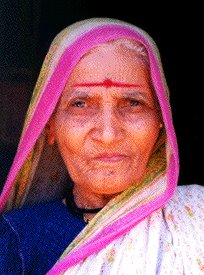
Performer/Singer: Dhondabai Gadhave
Village: Savindane
Taluka: Shirur
District: Pune
Caste: Kumbhar (potter)
Age: 75 (Dhondabai passed away on April 29, 2008)
Children: Three sons and three daughters
Occupation:
Potter and agricultural labourer
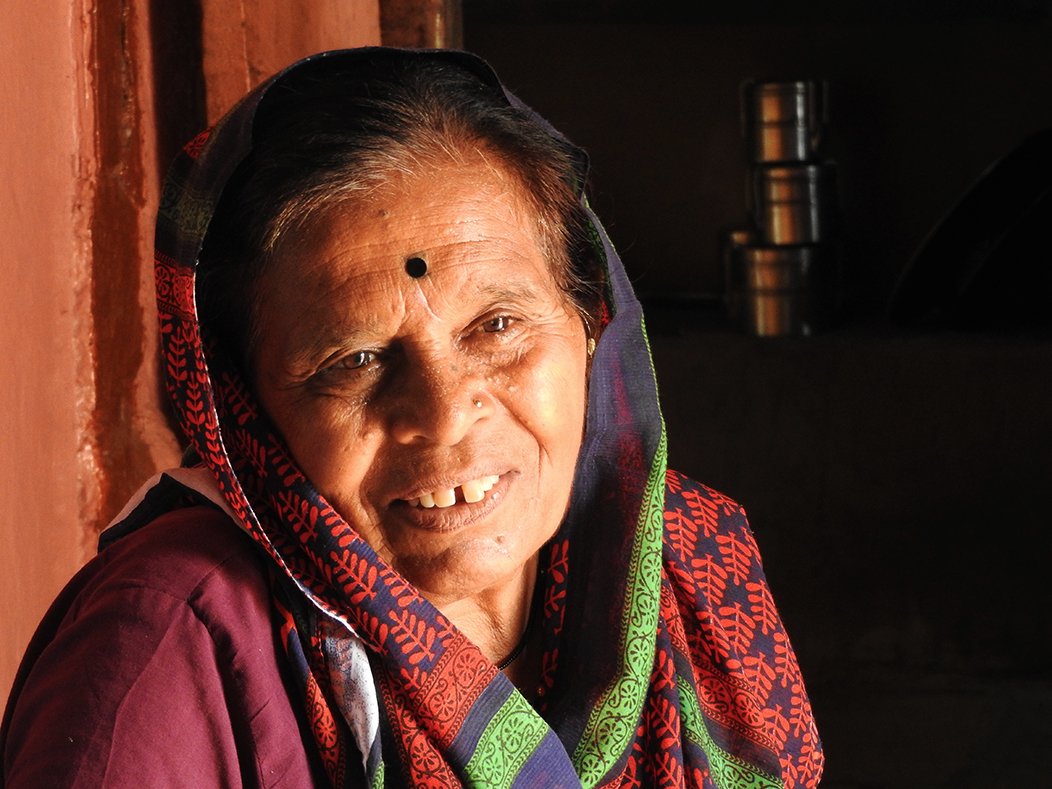
Performer/Singer: Anjanabai Gadhave
Village: Savindane
Taluka: Shirur
District: Pune
Caste: Kumbhar (potter)
Age: 56
Children: Two sons and three daughters
Occupation: Potter and agricultural labourer
These songs were recorded on December 13, 1995. The photographs were taken on October 8, 2017.
Photos: Samyukta Shastri
Poster: Sinchita Maji
